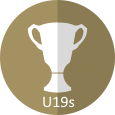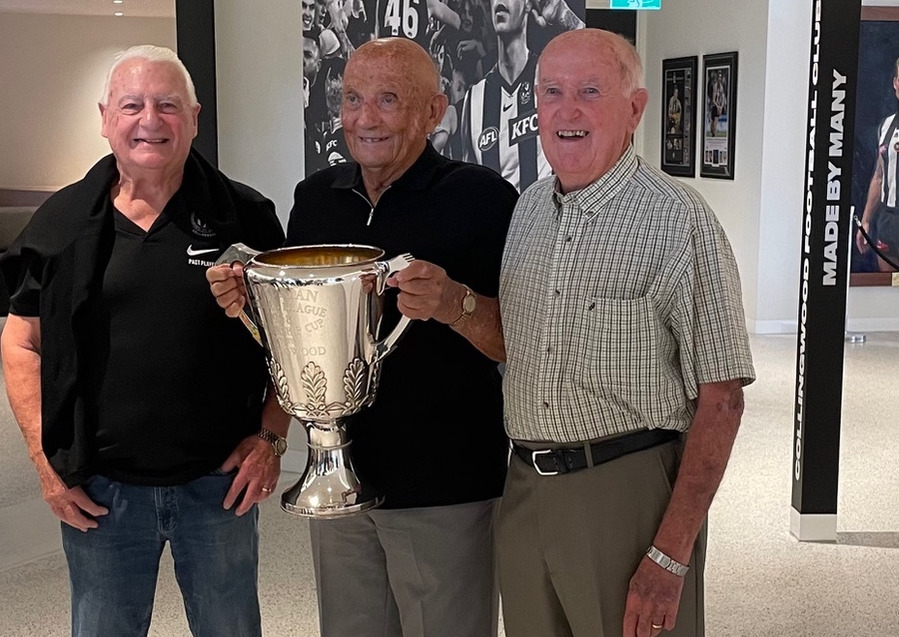
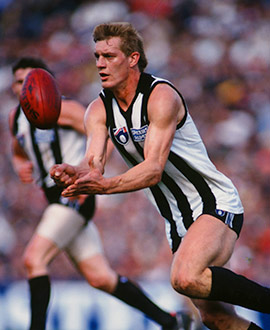
You really couldn’t have blamed Damian Monkhorst if he’d walked away from Collingwood after his first game of senior football.
There he was, all primed and ready to go. It was Round 2, 1988, and the 18-year-old kid from Woori Yallock was selected for his debut against Fitzroy at Victoria Park. A few family members had even travelled down from Toowoomba to see the young hopeful run out for the first time in a League game. It was a big moment for the kid, and for his family.
He took his designated place on the bench and waited. And waited some more. And kept waiting. James Manson was playing a great game on John Ironmonger, and coach Leigh Matthews, ever the pragmatist, could see no reason to change. Monkey even did some run-throughs in front of the coaches box to remind the coach he was still there, but to no avail.
In the end, Monkey spent his entire first game on the bench. And he wasn’t happy about it.
"I remember going up to Leigh after the game and telling him he could go and get stuffed,” he recalled later. “I said ‘I am going home to Woori Yallock, where I can at least enjoy my footy and play with my mates’."
Thank goodness he didn't follow through on that threat.
When Monkhorst finally did leave Collingwood, it was as a 200-gamer who had played in a Premiership, enjoyed multiple Copeland podium finishes and was regarded as one of the Club's favourite sons. He was a spiritual leader for most of his 12 seasons at the Club, and one of the most popular players in the change rooms.
His grandfather, Willem, was a Dutch missionary who took his family – including Damian's father Steven – from The Netherlands to Indonesia in the later 1950s, before ultimately settling in Australia. Monkhorst was born in Croydon, lived for a time in Scoresby, before the family moved to Woori Yallock. His dad barracked for St Kilda, but he didn’t choose a team. He had a soft spot for Melbourne and Hawthorn, as his favourite players were Robert Flower, Carl Ditterich, Peter Knights and Leigh Matthews.
He made a Victorian basketball squad when he was 15, alongside Shane Heal, a schoolmate from Upper Yarra Valley High School. He came to the attention of Collingwood scouts when his school team went on a big winning streak. One of his first dealings with Magpie recruiting staff came when they locked him and his school teammates in a toilet block – for their own safety – after a match against a northern suburbs school ended in an all-in brawl.
The distance between Woori Yallock and Victoria Park at times proved problematic. The Magpies even had a retired supporter drive him to some training sessions, but there was the issue of getting him home, which often meant getting a train back to Flinders Street, another one out to Lilydale and hitching a ride home to Woori Yallock.
Monkey gave his all every time he was at Victoria Park, but the distance and inconvenience was sometimes one hurdle too many.
Still, he proved to be a key member of Collingwood's under-19s Premiership side in 1986, and spent the next few years learning the ruck role, and competing for a spot with Manson, David Cloke and Wes Fellowes.
But he was issued with an ultimatum at a meeting with Matthews, football manager Graeme Allan and president Allan McAlister before the 1989 season. "They sat me down in the coaches' room and had it out with me," he said. "I was finding it tough to get to training. They basically said that I had to knuckle down and have a serious crack at it, or else."
The talk, he said, had some impact. But it was the birth of his first son (he and his partner Trudi would have four boys) in September 1989 that really made him settle down.
That coincided with his greatest moment in football. He transformed into one of the best young ruckmen in the game in 1990, playing every game of a memorable season, including the Grand Final. Despite being just 21, he looked completely at home not just on Grand Final day but through all the big games that had preceded it. Here was a big man who was made for the big games. Indeed, he was so relaxed on Grand Final day that he was seen doing burnouts down the Maroondah Highway on his way to the game.
He was one of Collingwood's best in the Premiership win – the club’s first since 1958 – and he kicked a crucial goal in the final term, easing the nerves of long-suffering Magpie fans. Tony Shaw won the Norm Smith Medal; Monkhorst won a Makita drill from 3AW as their best player. "I probably got more use out of that drill than Shawry did with his medal," he laughed.
Monkhorst’s strength and his competitive spirit were his best assets. He simply hated being beaten in contests, and loved the crash 'n' bash of ruck duels. He had a decent leap, was a good palmer of the ball and became bigger and stronger as his career went on. And while he didn't take a huge number of marks, he was a formidable presence in any contest and a good distibutor by hand or foot when he got the ball.
His best individual years came from 1992-94, where he won a hat-trick of Best Clubman awards as well as three separate thirds in the Copeland Trophy.
"He was just a fantastic leader," Tony Francis said. "He could intimidate the opposition, even though he was a bit of a softy off the field. You felt 10 feet tall playing alongside him."
Monkhorst was "selfless and always about the team”, according to Mick McGuane. “He had a physical edge and played his best footy when he was on that edge. You knew he always had your back."
Twice he inadvertently played a role in changing AFL rules.
He can laugh at one instance, when his decision to run through the Essendon huddle before a game in 1994 lead to the melee rule. "I should get a royalty for all the money they have made over the years," he joked.
The second instance, when he was accused of racial abuse of Michael Long during the 1995 Anzac Day match, is not something he is proud of, but he remains pleased it led to the racial vilification code. "I've had to live with that," he said. "I made a terrible mistake in the heat of the moment, but it led to a change that needed to happen.”
Injuries restricted his impact in the latter years, though he never stopped trying to make an impact. He played his 200th game in a win over St Kilda in the middle of 1999. That was Tony Shaw's last year as coach, and he admits the pair didn't always see eye-to-eye on things. "We're still close mates, but (when he was coaching) it was like two bulls colliding."
Monkhorst hoped to play on into 2000, to mentor the Club's likely No.1 pick Josh Fraser. But a meeting with new coach Mick Malthouse that he thought was about signing a new deal resulted in him in being shown the door. "I left in awkward circumstances, I would have liked to help out, but the Club didn't see it that way," he said.
He played a further season with St Kilda, then another decade – into his 40s - with Woori Yallock. He also became Hawthorn's ruck coach through its glory years. Many was the time that Magpie fans pined to have the big fella back coaching our own ruckmen.
Such was the impact Damian Monkhorst created in his 12 seasons at Collingwood. Strong, fiercely competitive, combative and effective, combined with a bit of a larrikin streak. He will always be a Collingwood fan favourite.
- Glenn McFarlane
CFC Career Stats
| Season played | Games | Goals | Finals | Win % |
|---|---|---|---|---|
| 1988-1999 | 205 | 45 | 7 | 52.2% |
CFC Season by Season Stats
| Season | GP | GL | B | K | H | T | D | Guernsey No. | ||
|---|---|---|---|---|---|---|---|---|---|---|
Other CFC Games
| Team | League | Years Played | Games | Goals |
|---|---|---|---|---|
| Collingwood | U19s | 1985 - 1988 | 23 | 9 |
| Collingwood | Night/Pre-season | 1989 - 1996 | 9 | 3 |
| Collingwood | Reserves | 1986 - 1999 | 50 | 18 |
Also Played For
| Team | League | Years Played | Games | Goals |
|---|---|---|---|---|
| St Kilda | AFL | 2000 | 10 | 0 |
Awards

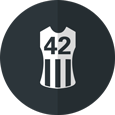 x3
x3
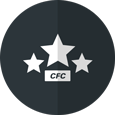
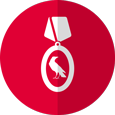
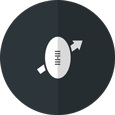

 x3
x3
